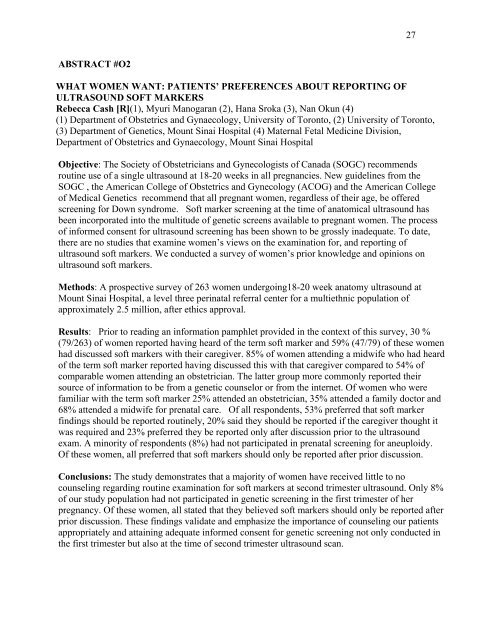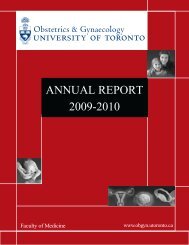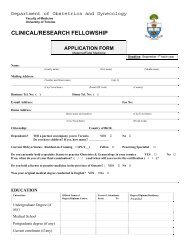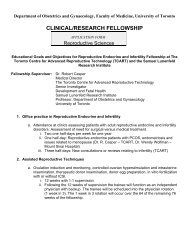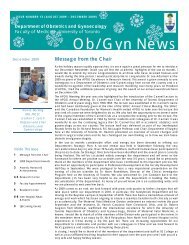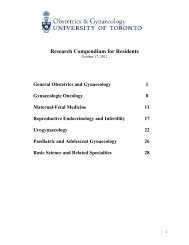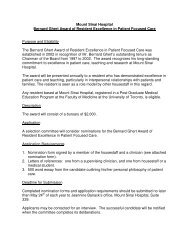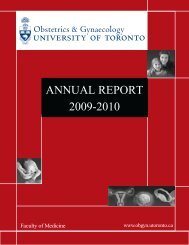research day - University of Toronto Department of Obstetrics and ...
research day - University of Toronto Department of Obstetrics and ...
research day - University of Toronto Department of Obstetrics and ...
Create successful ePaper yourself
Turn your PDF publications into a flip-book with our unique Google optimized e-Paper software.
27<br />
ABSTRACT #O2<br />
WHAT WOMEN WANT: PATIENTS’ PREFERENCES ABOUT REPORTING OF<br />
ULTRASOUND SOFT MARKERS<br />
Rebecca Cash [R](1), Myuri Manogaran (2), Hana Sroka (3), Nan Okun (4)<br />
(1) <strong>Department</strong> <strong>of</strong> <strong>Obstetrics</strong> <strong>and</strong> Gynaecology, <strong>University</strong> <strong>of</strong> <strong>Toronto</strong>, (2) <strong>University</strong> <strong>of</strong> <strong>Toronto</strong>,<br />
(3) <strong>Department</strong> <strong>of</strong> Genetics, Mount Sinai Hospital (4) Maternal Fetal Medicine Division,<br />
<strong>Department</strong> <strong>of</strong> <strong>Obstetrics</strong> <strong>and</strong> Gynaecology, Mount Sinai Hospital<br />
Objective: The Society <strong>of</strong> Obstetricians <strong>and</strong> Gynecologists <strong>of</strong> Canada (SOGC) recommends<br />
routine use <strong>of</strong> a single ultrasound at 18-20 weeks in all pregnancies. New guidelines from the<br />
SOGC , the American College <strong>of</strong> <strong>Obstetrics</strong> <strong>and</strong> Gynecology (ACOG) <strong>and</strong> the American College<br />
<strong>of</strong> Medical Genetics recommend that all pregnant women, regardless <strong>of</strong> their age, be <strong>of</strong>fered<br />
screening for Down syndrome. S<strong>of</strong>t marker screening at the time <strong>of</strong> anatomical ultrasound has<br />
been incorporated into the multitude <strong>of</strong> genetic screens available to pregnant women. The process<br />
<strong>of</strong> informed consent for ultrasound screening has been shown to be grossly inadequate. To date,<br />
there are no studies that examine women’s views on the examination for, <strong>and</strong> reporting <strong>of</strong><br />
ultrasound s<strong>of</strong>t markers. We conducted a survey <strong>of</strong> women’s prior knowledge <strong>and</strong> opinions on<br />
ultrasound s<strong>of</strong>t markers.<br />
Methods: A prospective survey <strong>of</strong> 263 women undergoing18-20 week anatomy ultrasound at<br />
Mount Sinai Hospital, a level three perinatal referral center for a multiethnic population <strong>of</strong><br />
approximately 2.5 million, after ethics approval.<br />
Results: Prior to reading an information pamphlet provided in the context <strong>of</strong> this survey, 30 %<br />
(79/263) <strong>of</strong> women reported having heard <strong>of</strong> the term s<strong>of</strong>t marker <strong>and</strong> 59% (47/79) <strong>of</strong> these women<br />
had discussed s<strong>of</strong>t markers with their caregiver. 85% <strong>of</strong> women attending a midwife who had heard<br />
<strong>of</strong> the term s<strong>of</strong>t marker reported having discussed this with that caregiver compared to 54% <strong>of</strong><br />
comparable women attending an obstetrician. The latter group more commonly reported their<br />
source <strong>of</strong> information to be from a genetic counselor or from the internet. Of women who were<br />
familiar with the term s<strong>of</strong>t marker 25% attended an obstetrician, 35% attended a family doctor <strong>and</strong><br />
68% attended a midwife for prenatal care. Of all respondents, 53% preferred that s<strong>of</strong>t marker<br />
findings should be reported routinely, 20% said they should be reported if the caregiver thought it<br />
was required <strong>and</strong> 23% preferred they be reported only after discussion prior to the ultrasound<br />
exam. A minority <strong>of</strong> respondents (8%) had not participated in prenatal screening for aneuploidy.<br />
Of these women, all preferred that s<strong>of</strong>t markers should only be reported after prior discussion.<br />
Conclusions: The study demonstrates that a majority <strong>of</strong> women have received little to no<br />
counseling regarding routine examination for s<strong>of</strong>t markers at second trimester ultrasound. Only 8%<br />
<strong>of</strong> our study population had not participated in genetic screening in the first trimester <strong>of</strong> her<br />
pregnancy. Of these women, all stated that they believed s<strong>of</strong>t markers should only be reported after<br />
prior discussion. These findings validate <strong>and</strong> emphasize the importance <strong>of</strong> counseling our patients<br />
appropriately <strong>and</strong> attaining adequate informed consent for genetic screening not only conducted in<br />
the first trimester but also at the time <strong>of</strong> second trimester ultrasound scan.


